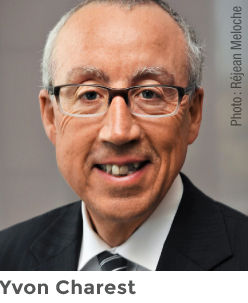 When regulation on disclosure of mutual fund commissions takes effect on July 15, 2016, segregated funds will be spared. This reality irks several mutual fund players, but Yvon Charest, CEO of iA Financial Group, is defending the status quo.
When regulation on disclosure of mutual fund commissions takes effect on July 15, 2016, segregated funds will be spared. This reality irks several mutual fund players, but Yvon Charest, CEO of iA Financial Group, is defending the status quo.
Segregated funds and mutual funds are not comparable, Charest stressed in an interview with The Insurance and Investment Journal, on the sidelines of the iA’s annual meeting. He does not even like the name segregated funds: he prefers separate funds.
“They are separate funds because in case of fraud or other problem, they’re protected by all of the insurer’s capital. Our company has capital of $4 billion, and separated funds are an integral part of that. Not to mention guarantees at death and maturity,” Charest points out. He adds that these guarantees have protected many clients who invested in high tech funds when the bubble burst in 2000.
Met with regulators
Charest says that the executives of Quebec insurers grouped under the Canadian Life and Health Insurance Association (CLHIA) recently met with Louis Morisset, the CEO of Quebec’s financial markets regulator, the Autorité des marchés financiers (AMF), to discuss the regulatory treatment of segregated funds. “We expressed our point of view to help them form an opinion.”
The crux of the question: disclosure of commissions. Was the message heard? “I think we made the AMF more aware of certain things,” he says. The AMF is reviewing the question and plans to decide on the steps to follow by 2016, Morisset told The Insurance and Investment Journal.
Charest thinks the industry already has sufficient regulation on disclosure. “In the past decade, oversight authorities carried out an excellent reform by ensuring that insurance and mutual fund companies disclose the total fees at the point-of-sale (management expense ratio). I am proud to say that insurers implemented this measure before mutual funds did,” he adds.
Reform rebuffed
Charest finds the Client Relationship Model Phase 2 (CRM2) ill-conceived. “Disclosing annually the total compensation that a distributor receives amounts to disclosing only part of the total management fees. Emphasizing distributor compensation sends the debate to the wrong place, far from the essence of the total fees that the client pays. This is the element that should be disclosed each year,” Charest argues.
According to iA’s statistics, deposit institutions hold 43% of mutual fund assets in Canada, and produce 50% of new sales. This gives financial institutions the leeway to play the disclosure card as they wish, he notes.
He worries that as of next year, these institutions can say that they pay their distributor zero compensation. In an integrated group, it is easy for the manufacturer to sign an agreement with the firm whereby it will not pay it any compensation, Charest explains.
“Clients will think they’re paying less, it’s a step backward from the smart measure of disclosing the total management expense ratio, which is done not only at the point-of-sale, but each year,” Charest says.









